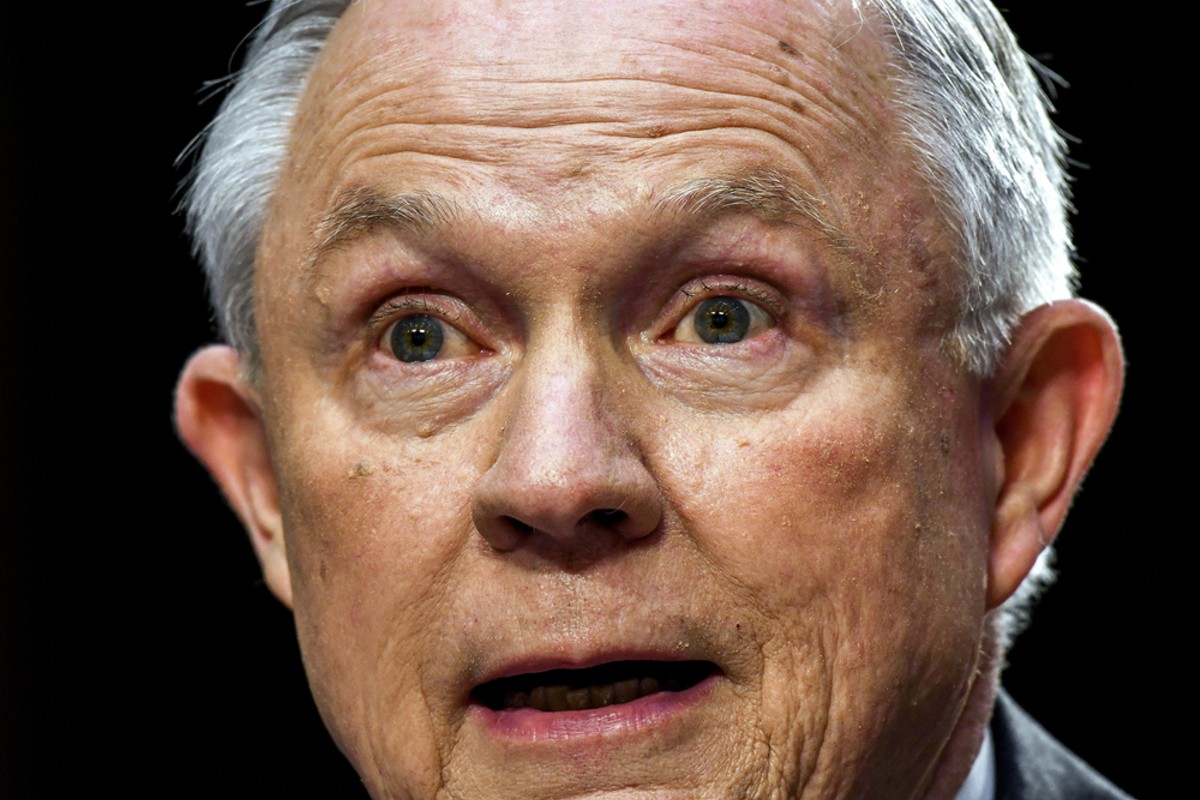The fog that generally wafts around marijuana policy just got thicker at a time when it seemed some clarity would be coming.
The same week that California — the sixth largest economy in the world — began recreational sales, U.S. Attorney General Jeff Sessions rescinded the Cole Memo, an Obama-era instruction to federal prosecutors not to go after marijuana businesses that are compliant with their state laws. In other words: If the state says they can be in business, leave them alone.
That memo was the reason many business owners across the country felt safe in opening up pot shops, grow operations, and the like. At least they wouldn't have to worry about the feds.
Not anymore. Having to worry about the feds coming in is a pretty substantial deterrent to the idea of sinking your money into a business.
"It introduces a degree of edginess," says one local who's building a grow facility in Warren.
That edginess translated to a newsworthy dip in U.S. marijuana stocks. It seems like every time we should be getting clarity on marijuana and where we are going with it, things just get mucked up.
While Sessions didn't order a crackdown on marijuana, he did give the OK to local U.S. attorneys to step in where they felt it was warranted.
However, a potent indicator of where we are at with marijuana emerged, with national and local lawmakers from both major parties pushing back against Sessions. Republican Representative Cory Gardner of Colorado, which was one of the first states to legalize marijuana for recreational use, was among the loudest among those opposing the policy change.
In Michigan, the environment is further clouded by the Sessions announcement just as the state is finally rolling out a production and distribution system.
State Attorney General Bill Schuette, historically a strident opponent to marijuana who has quieted down on the subject as he runs for governor, appears to have nothing to say on the issue.
But since it's campaign season, Dana Nessel, a contender in the August Democratic primary for attorney general, has made a point of supporting marijuana legalization in her campaign.
"Our state's next attorney general has to be more proactive in order make sure our state residents are protected from federal overreach," says Nessel. "I can think of no better set of circumstances that explain what that means. If this is not federal overreach what is? ... If I'm elected I would use every tool in the attorney general's arsenal to fight back to protect the people of Michigan."
Maybe Sessions just wanted to throw a scare into a crowd that he believes are "not good people," because it hardly looks like the feds are about to start a coordinated new offensive against marijuana. The Sessions announcement reportedly blindsided officials in other government departments.
While it's possible the Drug Enforcement Agency could put on a big show bust to send a shudder of fear through the industry, most observers don't see much bite in Sessions' bark.
And Americans don't want to see those teeth. The results of a recent Quinnipiac poll showed "Voters oppose 70-23 percent enforcing federal marijuana laws in states that have legalized medical or recreational marijuana."
In fact, over the last couple of weeks the legislatures of New Hampshire and Vermont voted to legalize recreational marijuana in their states. New Hampshire's legislation was particularly interesting. It tasked a committee to come up with a proposal for a statewide production and sales system. In the meantime, Vermont adults are allowed to have two mature plants and four young plants.
Here in Michigan, the MI Legalize organization has turned in a petition to put the question of recreational legalization on the November ballot. With support for the idea polling at around 60 percent it looks like a winner at the voting booth. Typically, when people have a choice, the majority vote in favor of marijuana.
Sessions' announcement could have an opposite effect to its apparent intention. It seems to have galvanized the political opposition to stand up and be heard. Ten mayors of cities in states where some form of marijuana is legal sent a letter to Sessions criticizing the policy change.
"If anything, I'm actually hopeful that by Sessions taking such a draconian [stance] to prosecuting marijuana businesses, it will spur legislative action to change that," says Nessel. "Congress has not done anything and they should have a long time ago. ... I don't think even Republicans think it would be good for them to watch as people are rounded up and put in prison."
It's not clear what Sessions is trying to do, but it seems he has managed to put a lot of feisty people on high alert. There are 29 states, plus Washington, D.C., with substantive medical marijuana laws, and there are now 10 states that have legalized recreational use. In December Fortune reported the 2017 marijuana market in North America would reach $10 billion.
That looks like pretty substantial pushback.
Meanwhile, in Detroit, things are about as stupid as Sessions' announcement. A Jan. 5 memo from the city Law Department notes the initiatives that were passed in November were being challenged in Circuit Court. It concludes with, "until further notice (1) the Initiatives shall not be Implemented and (2) no City department may accept, process, or approve any applications for a permit or license for any medical marihuana facility or medical marihuana caregiver center."
The memo does not make clear what that legal challenge is. There are a couple of legal challenges on Detroit's marijuana zoning ordinances. One of them would support the city's position that proposals A and B are illegal. A couple of others look to force the city to implement the proposals and approve businesses that were denied under the old ordinance. Under the new ordinances their zoning violations do not exist.
"The people of the city of Detroit voted overwhelmingly to opt the city of Detroit in to the state system and lift the restrictive zoning requirements," says Bloomfield Hills attorney Michael Stein, who represents about a dozen clients. "Yesterday [we] filed seven complaints for Mandamus that would force the city to accept my clients applications."
In the meantime, there are about 60 dispensary locations that have been approved under the city's original ordinances that will be allowed to proceed with their state license applications.
By not accepting any more applications, Detroit could be putting a cap on the number of dispensaries in the city. The deadline to apply for state licensing is Feb. 15, and the Circuit Court case on Detroit's ordinances is schedule for Feb. 16. Hmm...







